The Sisterhood of Martyrdom
Kimberlé Crenshaw brings the lives of Black female victims of police violence vividly into focus.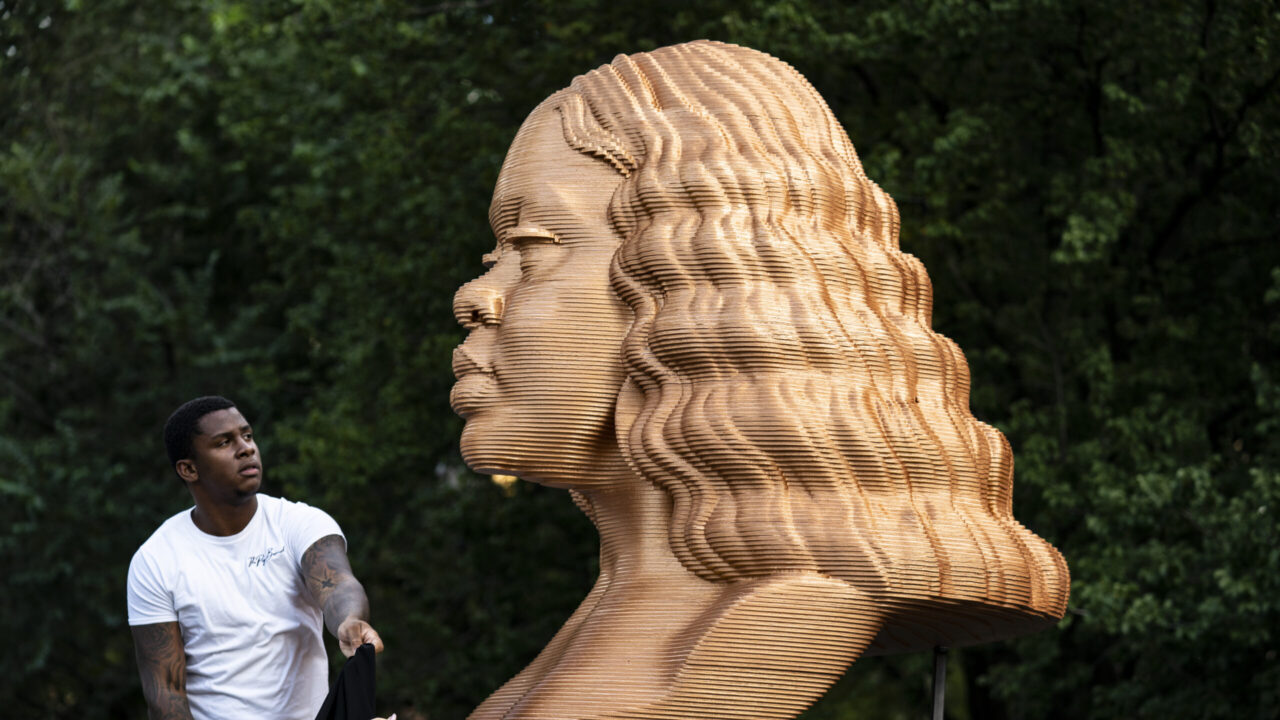 A sculpture of Breonna Taylor, one of three sculptures as part of the "SEEINJUSTICE" art exhibition that also featured the likenesses of George Floyd and John Lewis, Thursday, Sept. 30, 2021, at Union Square in the Manhattan borough of New York. (AP Photo/John Minchillo)
A sculpture of Breonna Taylor, one of three sculptures as part of the "SEEINJUSTICE" art exhibition that also featured the likenesses of George Floyd and John Lewis, Thursday, Sept. 30, 2021, at Union Square in the Manhattan borough of New York. (AP Photo/John Minchillo)
#SayHerName: Black Women’s Stories of Police Violence and Public Silence
By Kimberlé Crenshaw and the African American Policy Forum
Haymarket Books
In 2020, I participated in several Black Lives Matter demonstrations all over the Los Angeles area. Many were large-scale, noisy efforts, including long marches and rallies with passionate speeches by civil rights and community leaders and ordinary citizens who were outraged by police murders of Black citizens throughout the nation. Some of these involved sometimes massive confrontations with police, resulting in mass arrests and additional acts of brutality. Throughout these events, a common refrain was “Say His Name,” referring most frequently to George Floyd, the murdered young Black man in Minneapolis whose gruesome death on May 25, 2020, catalyzed the worldwide protests against police murders and structural racism in America.
To “Say His Name” signified a recognition that George Floyd, as well as such highly publicized other victims including Trayvon Martin, Michael Brown, Eric Garner, Walter Scott and scores, even hundreds, of others were more than mere symbols and martyrs. They were real people, with hopes and fears and aspirations for future lives, with loved ones who cared deeply for them and who felt pain and unbearable suffering with their deaths. By chanting their names, the crowds came to realize even more fully why these demonstrations needed to put a human face on mass protest. And for all too many participants, saying their names resonated personally, because so many Black marchers and protesters knew the pain of losing friends, acquaintances, neighbors, siblings, children from police violence.
Along with George Floyd, two other names stood out in many of these protests in the United States and throughout the world: Breonna Taylor and Sandra Bland. Breonna was the young woman in Louisville whom three plainclothes police officers fatally shot on March 13, 2020, when they entered her residence with a no-knock warrant. She was in bed with her boyfriend Kenneth Walker and was not alleged to have committed any crime. Sandra was found hanging in a Waller County, Texas jail cell on July 13, 2015, following her arrest three days previously for a minor traffic violation and confrontation with the arresting officer. Although her death was initially ruled a suicide, Bland’s mother ultimately received a $1.9 million settlement for wrongful death.
Crenshaw notes that while these women share the same vulnerability to police violence as Black men, they do not share the same national recognition or political response as that generated by their martyred brothers.
That was a small but hugely significant beginning to a tidal wave of recognition to the horrific losses of Black women and girls, from early childhood to very old age, at the hands of police. Their names, unlike those of Sandra Bland and Breonna Taylor, are not household names, even in Black communities. A powerful and timely new book has changed this. “#SayHerName: Black Women’s Stories of Police Violence and Public Silence” by renowned legal scholar Kimberlé Crenshaw and the African American Policy Forum elevates the tragic narratives of slain African American women into the arena of discourse. This unforgettable and necessary volume fuses a number of elements: heartbreaking first personal accounts from survivors, engaging artistic responses, incisive social analysis, capped by a striking In Memoriam coda.
Singer, songwriter, rapper and actress Janelle Monáe sets the tone effectively in her foreword to the volume. After listening to the mothers who lost daughters to police violence, she understood that she, like most Americans, had never heard of these tragic victims. She also realized that she herself, as a young Black woman, could easily have been listening to her own mother or aunt or grandmother. When she heard the stories, she saw — and felt — the human reality that always transcends the statistics. Above all, she decided that she had to exercise her personal responsibility to uplift the names of these women.
Crenshaw, the noted originator of the theory of intersectionality and a prominent scholar in the brilliant and absurdly maligned Critical Legal Theory movement, makes the focus of the book absolutely clear. She mentions some (but hardly most) of the names she has heard from her own listening experience: Tanisha Anderson, Aiyana Stanley-Jones, Kayla Moore, India Kager, Shelly Frey, Korryn Gaines. Crenshaw notes that while these women share the same vulnerability to police violence as Black men, they do not share the same national recognition or political response as that generated by their martyred brothers. The vast majority of readers would not recognize the names in this paragraph; neither did I. That is the essence of intersectionality and illustrative of a severe blind spot that only exacerbates the racism that has despoiled the nation since its inception.
The survivor accounts are the most difficult features of “#Say Her Name” to read. Mothers who have lost their daughters to police murders have been struggling both to comprehend their personal grief and to move their stories onto the national stage as part of a movement for recognition of their losses as women and mothers. Grief is incomprehensible as an abstraction, but the accounts here are real, palpable. They need the widest coverage possible because the daughters were deprived of fuller lives, with children, with partners, with jobs, with hopes, with aspirations, with all the struggles and pains and joys that life brings. One of the great achievements of Critical Race Theory is its capacity for storytelling. Since its inception, CRT has told stories of the people affected by racist laws and practices in extremely effective ways. This book adds yet another extraordinary dimension to that legacy with Crenshaw’s assemblage of these tragic personal memorials.
A significant feature of the #Say Her Name campaign has involved the arts, including music, poetry, visual expression, theater and other creative forms. This helps the community to stay together, enables survivors to resist degradation and empowers them to produce artistic products that help in the quest for social change. Above all, it facilitates healing. This is hardly new. African Americans have used art for all these purposes for centuries.
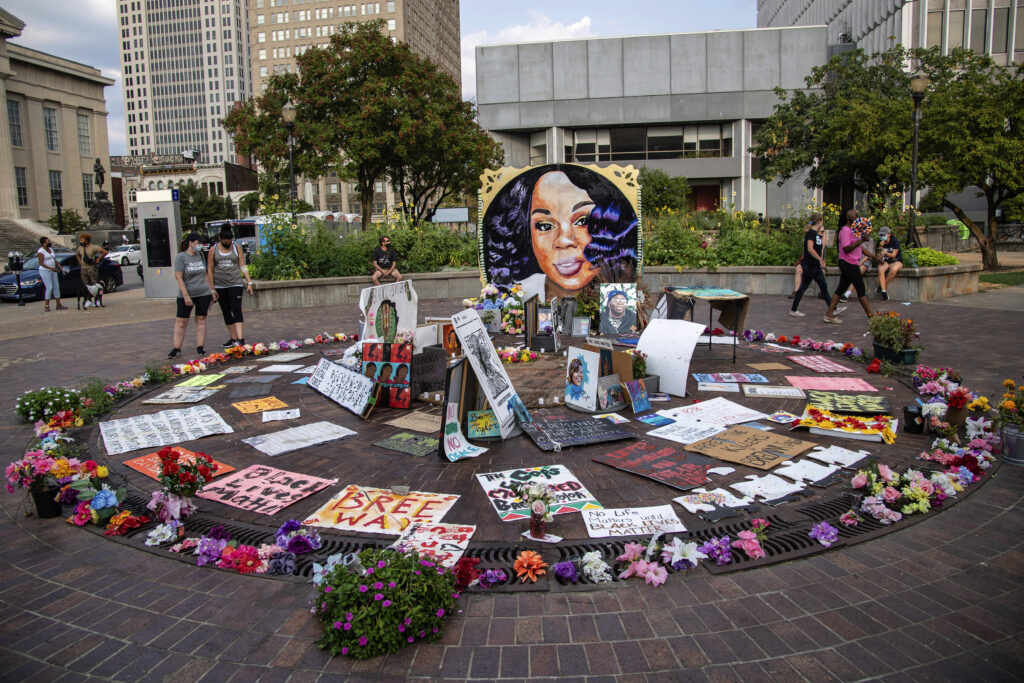
Throughout the nation, for example, impromptu tributes to Breonna Taylor appeared on streets throughout the United States. The above image, which shows a portrait of Breonna and other features of a makeshift memorial tribute from Louisville in 2020, captures the spirit effectively. Public art like murals, posters, impromptu memorials and related forms are simultaneously therapeutic and informative. An entire exhibition, “Promise Witness Remembrance,” on Breonna Taylor was mounted in 2021 at the Speed Art Museum in Louisville. It featured a number of magnificent works, including portraits and other visual efforts by prominent Black artists. Entire books have been written on all these features of Black cultural expression that have now become staples of the higher education curriculum despite pushback in some conservative states like Florida, Texas and elsewhere.
The African American Policy Forum has performed magnificently in mobilizing individual grief into collective action. The chanting, planting, dancing, drumming, singing and testifying demonstrate the resilience of Black women and their desire to memorialize their loved ones so that they are not forgotten. But there can be no real conclusion to this disconcerting phenomenon of police violence against Black women until it ends. In the words of Gina Best, one of the survivors featured in the book, “I walk around with an amputated heart.”
Your support matters…Independent journalism is under threat and overshadowed by heavily funded mainstream media.
You can help level the playing field. Become a member.
Your tax-deductible contribution keeps us digging beneath the headlines to give you thought-provoking, investigative reporting and analysis that unearths what's really happening- without compromise.
Give today to support our courageous, independent journalists.
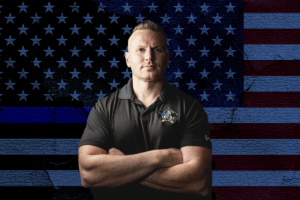
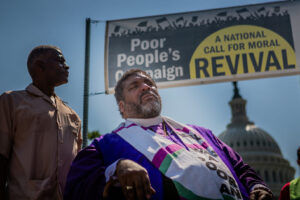
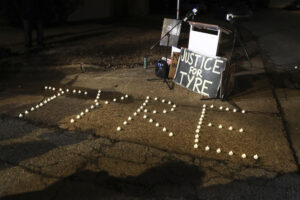

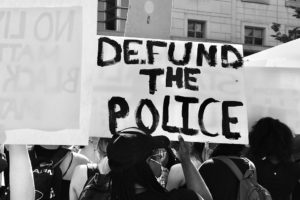

You need to be a supporter to comment.
There are currently no responses to this article.
Be the first to respond.